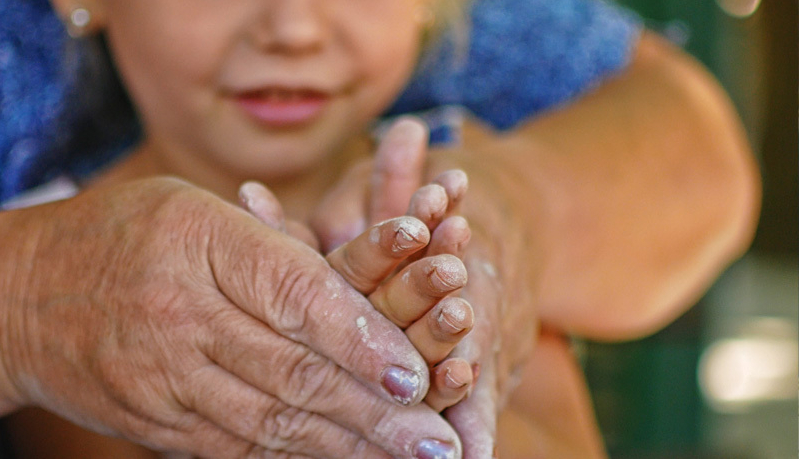
I help run day camps for children in Brazil and Costa Rica. This past summer, I heard from some teammates at our camp in Brazil who were surprised to see a 96-year-old camp volunteer jump on stage for something we call the “Crab Dance.”
It’s one of the highest-energy moments of the entire camp day—a day that often starts at 4:30 in the morning for our staff—and she was up there dancing with our staff and campers. It sounds unbelievable, and it even felt that way to the 20-something-year-olds who were still struggling to wake up as this woman’s energy outpaced that of the 7-year-olds around her.
We call her Tia Dalva, or “Aunt” Dalva. She’s been part of the church we partner with for decades. She knows the children who attend personally, and she knows their families. She understands the community and their needs in a way that I never could, coming in as an American.
Though we call her “aunt,” she is effectively a grandmother to many campers. She loves them, and they trust her. Her faithful presence in the lives of the children and families in her community will continue long after we pack up from a week of camp. And she is one of the reasons I love the intergenerational camp model so much.
A camp model more typical of American campers’ experience would be populated mainly by young campers and college-aged camp volunteers or staff. There are no grandmothers, to be sure. But when you involve the local church, as WinShape does in Brazil, Costa Rica, and throughout the United States, it flips that model upside down and introduces more generations of faithful believers to the mix.
There is a role for everyone
In an intergenerational camp model, there is a role for every single person to play.
In an intergenerational camp model, there is a role for every single person to play—no matter their age. There isn’t an expiration date on skills or experience. The camp environment needs all of us, whether we are jumping, dancing and cheering, cooking meals for the camp day, sharing the gospel in a small group moment, or finding another place at camp to tangibly show the love of Jesus.
Now, this isn’t to downplay the importance of college-aged staff. We see over and over how campers overwhelmingly respond positively to those young adults who love Jesus and are the epitome of “cool” in the eyes of campers. Campers are willing to share things and ask questions of them that they might not even ask their parents. Having these two generations sandwiched up against each other is powerful in its own unique way.
But widening the age range involved allows individuals to unlock parts of each other they never could have, had they not been intentionally mingled together in an intergenerational setting.
Most of us, for instance, think of the kids at camp more or less as passive recipients of the camp experience. But they aren’t. They’re receiving, certainly, but they’re also contributing. They’re inviting their friends. They’re talking and sharing in small groups. They are little image-bearers of God, and often bear powerful and surprising witness to His love.
Then you have college students. They are incredibly fun, culturally relevant, and bring the “cool factor.” They are everything these little kids want to be, and the campers’ hearts are so open to them. They are indispensable as part of the camp experience. Their witness is energetic, exciting and impactful.
The older generations bring unique wisdom.
However, the older generations bring unique wisdom. They bring something that younger believers can learn from—something that is only gained with the passing of time, experience, life and loss and everything God gives us the grace to bear in between. It’s because of this that Tia Dalva’s deep knowledge of and love for her community is irreplaceable.
Created for unity
It’s because of this that summer camp becomes even more beautiful as more generations are brought together.
“For as in one body we have many members, and the members do not all have the same function, so we, though many, are one body in Christ, and individually members one of another,” we read in Romans 12. “Having gifts that differ according to the grace given to us, let us use them...”
No generation is meant to do its work in total isolation from the others. We’re called to unity as the body of Christ. We’re called to do life together. We’re called to learn from one another.
And if we’re afraid to start bridging the gap between generations, we’re going to miss out on everything those younger and older than ourselves have to offer. God doesn’t call us just to scatter into generational cohorts like young marrieds, young singles, kids and the elderly. He calls us to function as one body, connected and dependent on one another as we glorify Him and fulfill the purposes that He has given us to do.
This is something that I have learned from my brothers and sisters in Christ in Brazil. They have taught me to bridge age gaps, to serve and be served in every season of life, and to love and learn from Christians across generations and across cultures.
Living in isolation can be terribly lonely and was never God’s intention for His people. But with His help, we can embrace the community God has given us in the Church, alleviating this loneliness.
Let’s build communities where we can live together as the Body of Christ.
So together, in all of our diversity, let us build unity. Let’s build communities where we can live together as the Body of Christ—and maybe, just maybe, that starts with a summer camp.
Margaret Sharpe leads the international camp ministry for WinShape Camps. In addition to leading camps in Brazil and Costa Rica, she focuses on discipling college students and training leaders around the world on how to reach their communities with the gospel.





